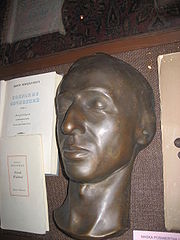In response to the recent talks about the new Tosca at the Metropolitan Opera, directed by Luc Bondy, I came to the conclusion that it's about time for me to summarize what I actually think. I'm open to discussion. An "IMHO" applies to all of it, as a matter of course.

Yes, I do think that Carsen's Rusalka was bad, and no, I'm not afraid to say it.
Firstly and primarily, my opinion is that a director is just another interpreter - next to the conductor and the soloist. He or she should be seeking the best ways how to present the author's vision to the members of the audience.
The most often performed operas were composed in the 19th century. Everything about them is romantic (or "Realistic", haha). The problem of most "modern" productions is that they interfere with the opera, rather than interpret it. Dvořák composed a romantic fairy-tale, Carsen directs it as a psychological drama, making everybody who understands Czech laugh their head off. The reason for giving this example is the critical acclaim of this production. If you want a DVD with Rusalka, you can choose between an English one and this one.
My favourite simile is that to a painting and a frame. Operas are like Romantic or Realistic paintings. They work the best in those wooden, artistically crafted frames, OR in frames which don't interfere with them. On the other hand, can you imagine a Géricault in, say, a neon frame? No matter how interesting the frame is, its task is to frame a painting by Géricault, in which it fails.
According to many today's philosophers, the Enlightenment fable, that "the newer, the better", is rooted deeply in our society. A director will be praised (because the booing ones will be put aside as philistines), if his/her production is "innovative". As if there were the connoisseurs on one side, and the conservative grannies (whom every decent connoisseur scorns) on the other side.
Not that I am saying that Carsen is a bad director or that we should have a set amount of productions repeating. Even though, it's not a bad idea - just like we have a set amount of classical operas, musicians are trying to find the best way within what they offer... Imagine directors studying day in, day out, how to approach a Zeffirelli! Anyway, everybody should be reasonable, and not lament on the absence of candles in a Tosca, but, at the same time, not approving Tosca resting on a couch and revel in the sight of the dead Scarpia. Or any of the many things wrong with this production, for that matter.
A word [a little] against the "traditionalist" productions. I think it is actually quite difficult to direct such a production. Yes, if you fail, you don't insult anybody, but there are as many productions which lack some chemistry and are essentially boring, as the abortive "modern" ones.
Respect, man, just a little bit. For the author, performer, work, everything.
Just an off-topic footnote: Why do so many directors seem to relish in being despotic? It's a psychological 101, especially in a performing genre. The actor (singer) must know your (director's) intentions, and must trust them and agree with them. It's a hard enough job, why make it even harder by pushing them to things? Moreover, they might come with something useful on their own. A good leader is not a tyrant.


